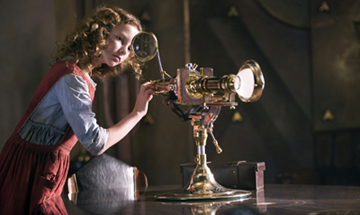|
|
Top 12 Film Industry Stories of 2007 #12:
|

|
The Lord of the Rings franchise earned a grand total of $2.92 billion dollars in worldwide box office revenue. The "least" successful title from the trilogy, Fellowship of the Ring, accrued $870.8 million, meaning that the worst of the three is still the 14th most successful title in box office history. The three titles averaged $975 million worth of box office with the final chapter in the saga, Return of the King, becoming the second biggest movie ever with roughly $1.13 billion in worldwide receipts. The Peter Jackson adaptation of J.R.R. Tolkien's masterwork proved that fantasy movies did not have to be predicated upon pubescent wizards. Mystical epics primarily targeted toward grown-ups could be just as successful. New at BOP: Share & Save
![]() Tweet
Tweet
![]() Print this column
Print this column
Despite this staggering series of box office performances, there were still those who believed that Tolkien's work was the fantasy equivalent of Star Wars. Its ticket sales dominance in no way guaranteed future epics would achieve such dizzying heights of box office appeal. Another trial began with the release of The Chronicles of Narnia: The Lion, the Witch and the Wardrobe. If a title considered to have less mainstream appeal than The Lord of the Rings could attain similar worldwide popularity, maybe the fantasy genre would prove itself to be an untapped yet lucrative market for film studios. $740 million in worldwide revenue later, that theory appeared to have held up. This series of events had a domino effect on New Line Cinema.
New Line had some success in the past, particularly with the sequels to Mike Myers' Austin Powers: International Man of Mystery and the Jackie Chan/Chris Tucker buddy movies in the Rush Hour franchise. Nothing they had experienced even scratched the surface of what Jackson's masterworks would achieve, though. The problem with this, if such a serendipitous reversal of fortune could have any problems, is that the studio had given Jackson a lucrative contract for his efforts. Included in this deal was a back-end plan of revenue sharing wherein Jackson was rewarded with a percentage of the financial income of The Lord of the Rings trilogy. The studio's generosity went far enough that Jackson has been by his own admission made a man worth a quarter billion dollars just from these three titles.
|
Advertisement |
The problem stemmed from the fact that Jackson believed they were a couple hundred million short in paying him what was truly owed. The end result was that the natural successor to the New Line schedule, a Hobbit prequel, was forestalled due to friction between studio execs and the genius responsible for creating the films worth $2.92 billion worth of revenue. New Line studio boss Robert Shaye, a producer on the Lord of the Rings trilogy no less, went so far as to say the following: "I do not want to make a movie with somebody who is suing me. It will never happen during my watch." A line was drawn in the sand.
Seeking to move forward in a manner that would show New Line was fine without their New Zealand frenemy, the studio lined up its next big budget trilogy. The choice was Philip Pullman's His Dark Materials trilogy, starting with the author's best known work, The Golden Compass. Hugely popular in his native England, this novel was selected as one of the ten most important novels of the past 70 years by the same panel of judges that had previously awarded it the Carnegie Medal. The popular British newspaper, The Observer, went so far as to name it one of the best 100 novels of all time. Being on the same list as A Pilgrim's Progress, Wuthering Heights and David Copperfield is a heady accomplishment for any scribe.
The problem is that not all respected novels are adapted into popular movies. In the case of The Golden Compass, this would be an understatement. Production was a struggle from the start. The novel's central premise involves a central organization modeled after The Catholic Church who has lost their way, becoming a misguided overlord of the people. American Pie director Chris Weitz, an odd choice to helm a fantasy epic anyway, was at a crossroads in how to adapt the novel. He eventually settled upon a vanilla interpretation that would be less incendiary to organized religion, a decision that did not sit well with avowed atheist Pullman. Even worse, the two actors brought on board to anchor the project, Nicole Kidman and Daniel Craig, had recently worked together on a doomed production known as The Invasion. So disastrous was that shoot that almost the entirety of its footage was discarded when the team behind V for Vendetta was hired to clean up the mess. The film was reviled by critics and earned only $15 million against a reported negative cost of roughly $100 million. The Kidman/Craig tandem was off to a lousy start as the next Butch and Sundance, to say the least.
Continued:
1
2

|
|
|

|
Thursday, October 31, 2024
© 2024 Box Office Prophets, a division of One Of Us, Inc.

